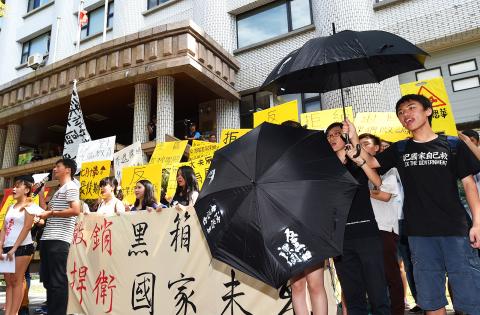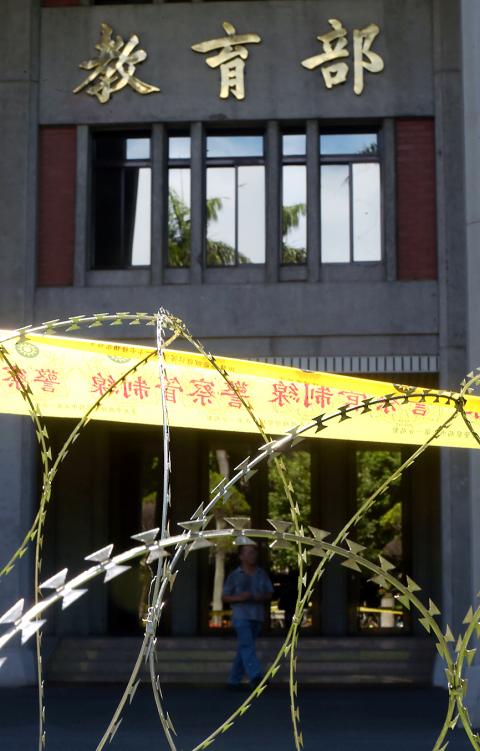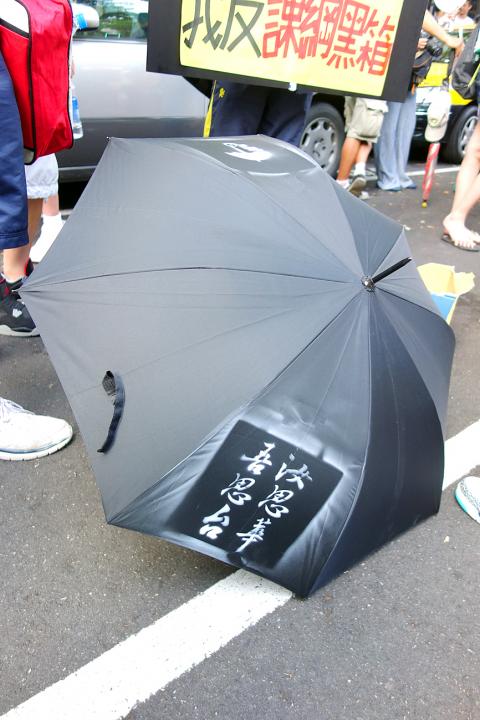Hundreds of high-school students in Taipei yesterday protested against what they said was the Ministry of Education’s “China-centric” alterations to curricula.
Protesters said their use of an image of a black umbrella looming over Taiwan signified the ministry’s “opaque” and “arbitrary” manipulation of textbooks.
Protesters called for the ministry to abolish the curriculum guidelines set to be introduced at the beginning of next month.

Photo: Chien Jung-fong, Taipei Times
If the ministry does not respond to their appeals by Friday, they would consider taking more “radical” measures, the demonstrators said.
They accused the government of manipulating the nation’s history and attempting to inculcate a China-centric viewpoint among students by altering the content of students’ history, geography and civic education textbooks.
The students called on the ministry to retain the 2009 curricula, saying that they focused on Taiwan and did not focus on China unnecessarily in the way the new editions do.

Photo: Wang Min-wei, Taipei Times
Taoyuan High School Alliance spokesperson Ko Ning-yu (柯甯予) said the ministry claims the new curriculum guidelines are designed according to constitutional statutes. However, social atmosphere, public sentiment and international politics have all changed drastically since the time the Constitution was promulgated, and people generally do not perceive China and Taiwan as having strong ties anymore, he said.
He said the ministry should not have approved outdated curricula.
“We have serious doubts over the credentials and professionalism of the curriculum review committee, whose members are assigned by the ministry,” he said.

Photo: Wu Po-hsuan, Taipei Times
Event co-convener Mu Yu-feng (慕宇峰), who recently graduated from National Hsinchu High School, accused the government of changing substantial portions of textbooks about the nation’s past and depriving young people’s right to learn about the nation.
Taiwan Association for Human Rights legal specialist Hsu Jen-shuo (許仁碩) said his organization has been fighting a legal battle against the ministry’s failure to ensure transparency since the new curricula were announced in February last year.
Although the court ruled in favor of the association, the ministry has appealed and the case is now awaiting a ruling by the Supreme Administrative Court, he said.
He panned the ministry’s reticence on the content of the new curricula, saying that protesters had to piece together information they obtained from legislators and other sources to get an idea of the agency’s dealings.
“The mentality of the ministry is: ‘Just because we do not want to disclose information does not necessarily mean we have done anything wrong.’ They just refuse to reveal any information [on the curricula],” he said.
He said that textbook publishers have allocated more space for China-related content, so that the materials they put out gain the ministry’s approval.
The students later wrote down their opinions on the guideline changes on the back of an open letter to Minister of Education Wu Se-hwa (吳思華), which they threw across the ministry’s gates.
The act was a plea to the minister to stop treating their appeals with indifference, they said.
Democratic Progressive Party Chairperson Tsai Ing-wen (蔡英文) yesterday voiced support for the students’ protest, calling it a “civic education lesson outside of the classroom.”
She said she feels hopeful when she sees so many young Taiwanese out in the streets determined to learn for themselves and urged society not to judge them based on political prejudices.
“The curricula must be based on facts, and the creation of curricula should follow the guidelines of objectivity and professionalism. If the government does not change their mind, we will shoulder the responsibility next year,” Tsai said on Facebook.
Additional reporting by Loa Iok-sin

AGING: As of last month, people aged 65 or older accounted for 20.06 percent of the total population and the number of couples who got married fell by 18,685 from 2024 Taiwan has surpassed South Korea as the country least willing to have children, with an annual crude birthrate of 4.62 per 1,000 people, Ministry of the Interior data showed yesterday. The nation was previously ranked the second-lowest country in terms of total fertility rate, or the average number of children a woman has in her lifetime. However, South Korea’s fertility rate began to recover from 2023, with total fertility rate rising from 0.72 and estimated to reach 0.82 to 0.85 by last year, and the crude birthrate projected at 6.7 per 1,000 people. Japan’s crude birthrate was projected to fall below six,

Conflict with Taiwan could leave China with “massive economic disruption, catastrophic military losses, significant social unrest, and devastating sanctions,” a US think tank said in a report released on Monday. The German Marshall Fund released a report titled If China Attacks Taiwan: The Consequences for China of “Minor Conflict” and “Major War” Scenarios. The report details the “massive” economic, military, social and international costs to China in the event of a minor conflict or major war with Taiwan, estimating that the Chinese People’s Liberation Army (PLA) could sustain losses of more than half of its active-duty ground forces, including 100,000 troops. Understanding Chinese

US President Donald Trump in an interview with the New York Times published on Thursday said that “it’s up to” Chinese President Xi Jinping (習近平) what China does on Taiwan, but that he would be “very unhappy” with a change in the “status quo.” “He [Xi] considers it to be a part of China, and that’s up to him what he’s going to be doing, but I’ve expressed to him that I would be very unhappy if he did that, and I don’t think he’ll do that. I hope he doesn’t do that,” Trump said. Trump made the comments in the context

SELF-DEFENSE: Tokyo has accelerated its spending goal and its defense minister said the nation needs to discuss whether it should develop nuclear-powered submarines China is ramping up objections to what it sees as Japan’s desire to acquire nuclear weapons, despite Tokyo’s longstanding renunciation of such arms, deepening another fissure in the two neighbors’ increasingly tense ties. In what appears to be a concerted effort, China’s foreign and defense ministries issued statements on Thursday condemning alleged remilitarism efforts by Tokyo. The remarks came as two of the country’s top think tanks jointly issued a 29-page report framing actions by “right-wing forces” in Japan as posing a “serious threat” to world peace. While that report did not define “right-wing forces,” the Chinese Ministry of Foreign Affairs was